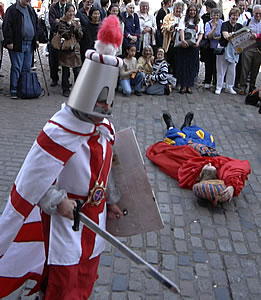I've been reading it (a performance now is almost impossible to see - indeed, should be, because, despite any archaeological interest, Shakespeare re-wrote and expanded it into a series of much better plays).
The trouble is it is difficult to read fairly - I know what was written after, and, with hindsight (you can't read without it) see
what Shakespeare will do with this play. What is interesting though is how indebted Shakespeare is to this earlier version, not just for a story line, but for character, stage business - and a lot of what-not-to-do.
And, always there, the question - did he know it from the inside? Is this one of the works he acted in?
Another leap gets made - did some of the same actors play in Shakespeare's Henry plays? Was Falstaff, for example, expanded as a role to be played by the same actor who played 'Oldcastle'? - It would give an extra 'piquancy' to the apology and disclaimer of the later plays.
The biggest difference is in the language - there is little of Peter Brook's poet here: Jokes and word play abound, some to be echoed later by Shakespeare. One exchange that jumped out for me was over the job of cobbler: Surely this is the spark that ignited the opening exchange in Julius Caesar?
But there are some very close lines - Here King Henry says,
"My lord prince Dolphin is very pleasant with me"
- not a great distance from the more familiar:
"We are glad the Dolphin is so pleasant with us," (Act 1 Scene 2, Henry V)
But what a difference - the 'me' to 'us' - and from a personal insult to an international crisis.
And surely I am not wrong to hear in,
"My Lords and louing Countrymen,
Though we be fewe and they many,
Feare not, your quarrel is good, and God will defend you:"
the 'very words' that 'stir up the hearts' of every Englishmen, when fine tuned by Shakespeare:
"We few, we happy few, we band of brothers;" (Henry V, Act 4, Scene 3)
Taking another cue from Brook, I am curious to know where the play was performed - or intended for performance. It has a feel of a small space - a very flexible space - a pub yard? There is no of that 'dimension' in the writing which shows a depth and juxtaposition of ideas. Scenes flow rapidly from one to the other and the amount of 'knock-about' comedy surely indicates a boozy, boisterous audience?
This Henry is 'one of the boys' - he is a down and out rough with none of the 'pretence' Shakespeare gives him. Or feels the need to give him.
And most of the other characters too have not yet gained the dimensions they will achieve in Shakspear's play: Principle here is surely Oldcastle!
Sir John Falstaff is not Oldcastle (Shakespeare tells us this clearly enough) - he has 'surfeit swelled' by absorbing the bodies of so many other of the characters from this play - he is an amalgam (like a recent Dr Who Monster absorbing others and having their faces pushing out all over its body).
In this play, The Famous Victories - Henry rejects a variety of his ex-colleagues: Jockey, and Tom and Ned: Shakespeare concentrates and intensifies all this rejection into Sir John.
There is direct stealing by Shakespeare - the hangman idea (and is the knocking at the gate going to pop up in Macbeth?) and borrowed material - Shakespeare refers to Hal's encounter with the Chief Justice but this play shows it.
Here the tennis balls are a constant theme - which allows Shakespeare to refine a single joke.
There are adaptations and shifts - surely the Hal/Falstaff double enactment of the future encounter between Hal and his father is proto-typed in the acted out court scene and then the re-enacted court scene using 'clowns'?
What a brilliant shift Shakespeare makes - what depth and 'poetry' come into it as a result of this change (one is tempted to say, slight of hand).
And another shift of note is the departure of Hal's former cronies for France - many of the same people are present, but here they are pressed - the magnificent melancholy of Shakespeare's play is nothing more than an opportunity for more knock-about (including a Shrew-like wife).
Technorati Tags:
Shakespeare,
Henry V,
Theatre










